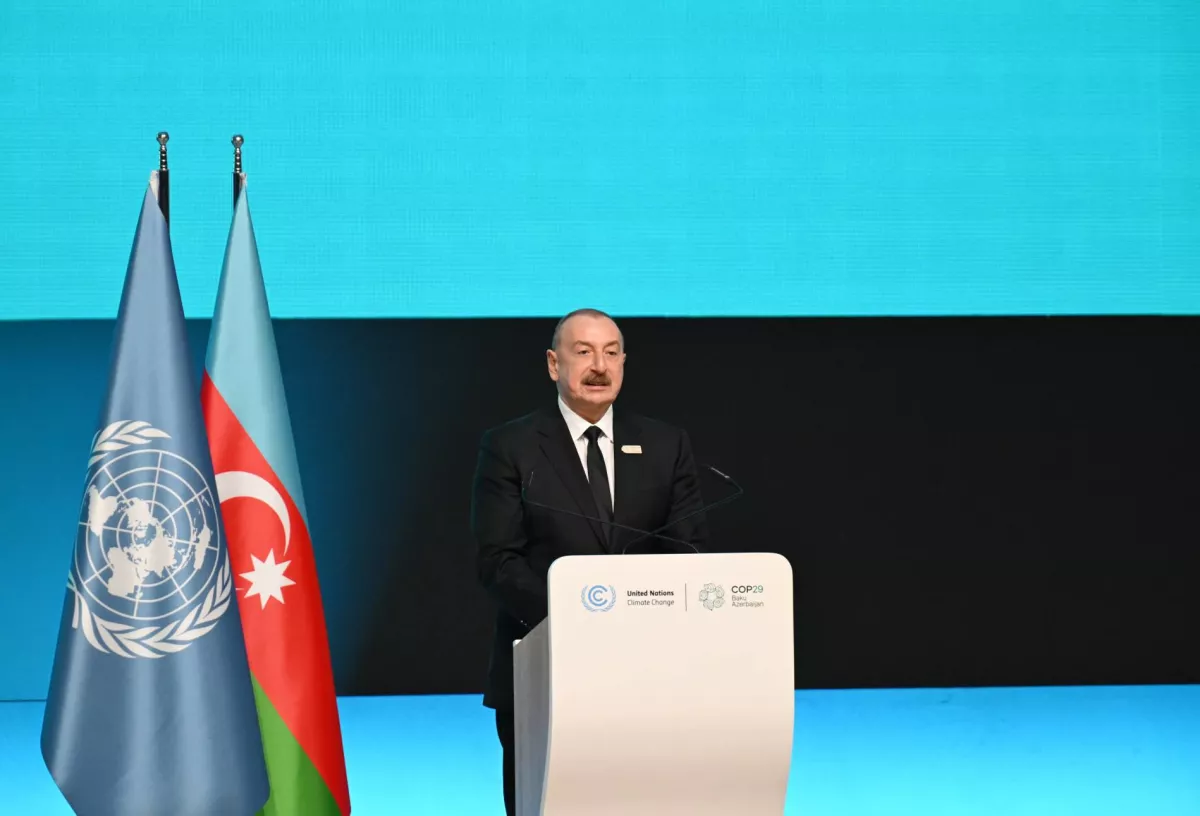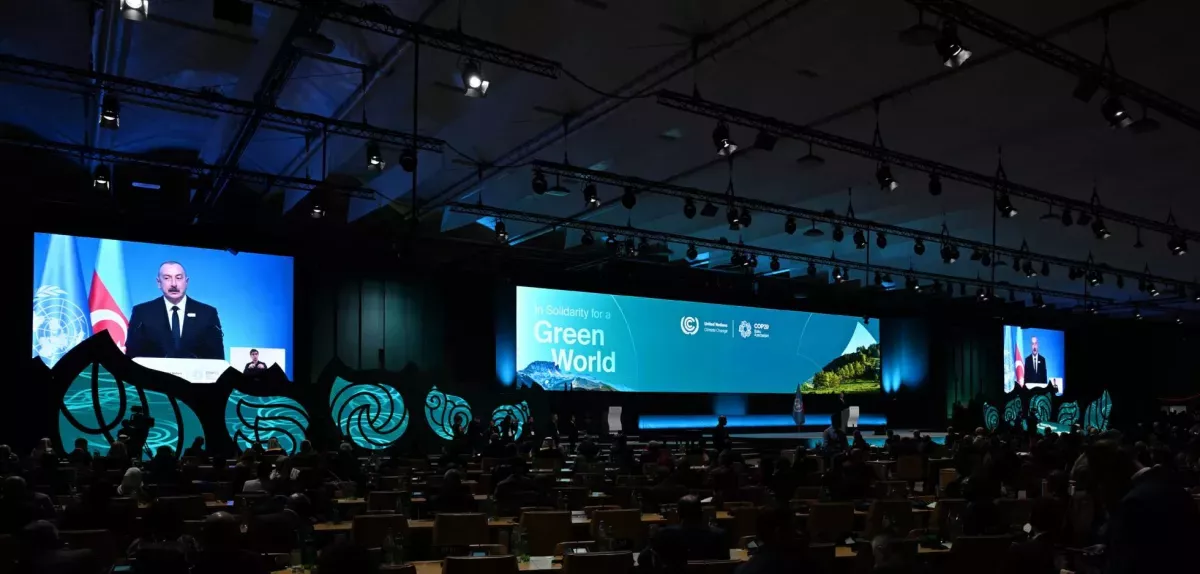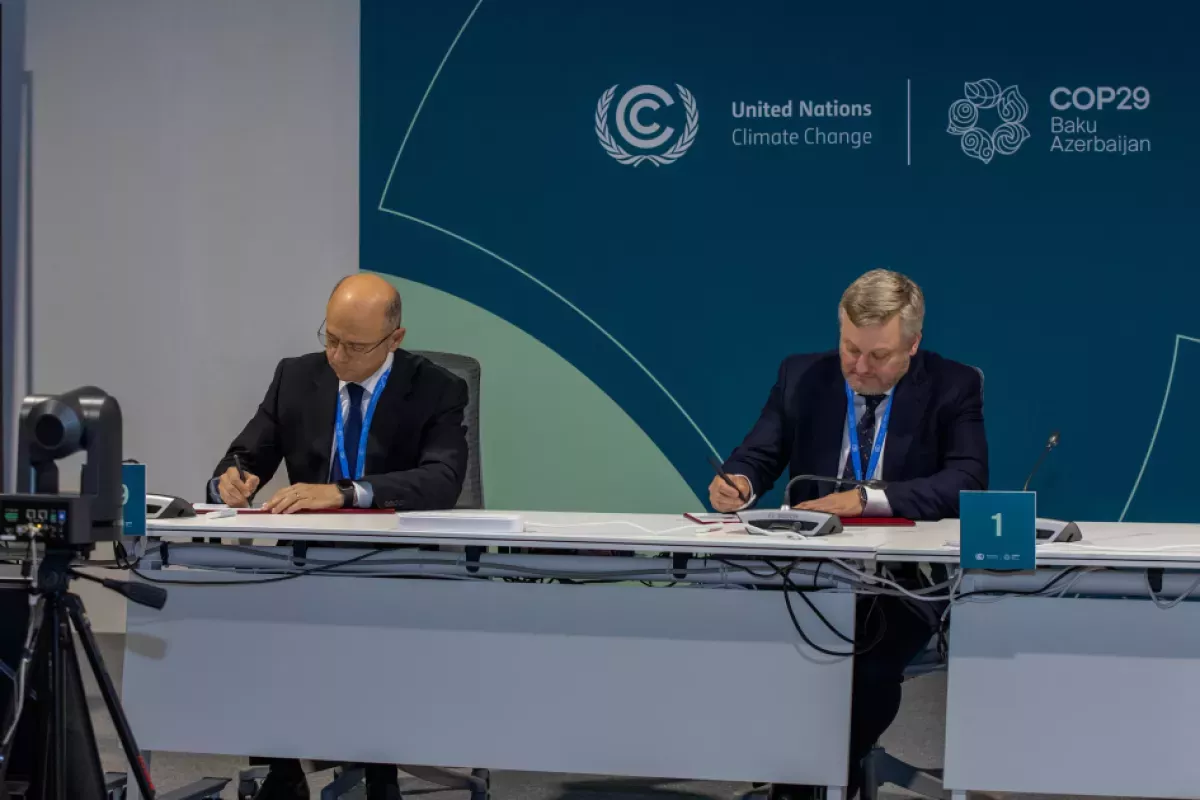Azerbaijan paving the way for a "green" future COP29 Leaders’ Summit
On the second day of the UN Framework Convention on Climate Change (UNFCCC) Conference of the Parties (COP29) in Baku, the Leaders' Summit was officially opened. The opening remarks were made by the President of Azerbaijan, Ilham Aliyev, and the UN Secretary-General António Guterres, who outlined key goals for the global "green" agenda.
Another significant milestone was reached the same day, as Azerbaijan's Ministry of Energy and BP jointly broke ground on the Shafag Solar Power Plant, a 240 MW project located in the "green" energy zone of Eastern Zangezur.
"Azerbaijan is a country where East and West, North and South meet, and this is not only about geography. We can build political, cultural, energy, trade, and transportation bridges between different international actors," said President Ilham Aliyev during his speech at the opening ceremony of the COP29 Leaders' Summit in Baku on November 12. "As the President of COP29, Azerbaijan will do its best to find a common understanding between developed and developing countries, between the Global South and the Global North," he added.
The President emphasized that the mega-projects initiated by Azerbaijan have already reshaped the energy and transport landscapes of Eurasia and fostered the creation of fruitful multilateral cooperation formats. These efforts have not gone unnoticed on the international stage.
"Last December, by a unanimous decision of almost 200 countries, Azerbaijan was honored to host COP29. We consider this decision as a sign of respect for our country, as well as an appreciation of our active role on the international arena... So, the world has gathered in Baku, and we say to the world: Welcome to Azerbaijan," said President Ilham Aliyev in his speech.
President Aliyev highlighted that 72,000 participants from 196 countries have registered for the UN Climate Conference in Baku, including 80% of presidents, vice presidents, and prime ministers.

During his speech at the opening ceremony of the COP29 Leaders' Summit, the President also addressed the unfounded accusations directed at Azerbaijan by some European politicians, emphasizing the crucial role of Azerbaijan in ensuring the energy security of Europe.
"The President of the European Commission came to Baku two years ago to sign this document with us. Because they needed our gas due to the change of geopolitical situation, and they asked us to help," said the President of Azerbaijan.
Azerbaijan continues to flawlessly fulfil its commitments in the gas sector. Specifically, between January and September of this year, Azerbaijan exported 9.4 billion cubic meters of gas to Europe, which is a 9.3% increase compared to the previous year. In total, gas deliveries from Azerbaijan to Europe through the Trans Adriatic Pipeline (TAP) amounted to approximately 40 billion cubic meters from December 31, 2020, to mid-September of this year. As recently noted by Luca Schieppati, Managing Director of the TAP pipeline company, the technical and commercial attractiveness of the Trans Adriatic Pipeline and its flexibility have been highly valued by operators: today, 43 companies are authorized to reserve pipeline capacity. Furthermore, by the beginning of 2026, TAP’s transportation capacity will be increased by 1.2 billion cubic meters of gas per year.

Despite the insinuations, slander, and double standards of some Western politicians, Azerbaijan has always kept its word, fulfilling all its commitments, and remains focused on consistent cooperation in the future—whether through agreements in traditional energy sectors or in rapidly developing initiatives in the "green" track. This message is particularly important in the context of forming new cross-border energy bridges across the vast Eurasian continent. Specifically, it concerns Azerbaijan's commitments to implementing the "clean environment" and "green growth" concepts as key priorities for the country's development until 2030 and beyond. This includes the development of renewable energy generation, the creation of "green" energy zones, decarbonization of oil and gas operations, improving energy efficiency, and advancing electric mobility.
"Our country plans to implement ambitious mega-projects at both the national and international levels by 2030, which will allow Azerbaijan to become a 'green growth' nation and a supplier of renewable energy," said Azerbaijani Minister of Energy Parviz Shahbazov on November 12 during the event Ministerial Dialogue: Expanding Investments to Triple Renewable Energy Use and Double Energy Efficiency. "In total, solar and wind power plants with a combined capacity of 2,250 MW, which will be commissioned in Azerbaijan by 2030, will increase the share of renewable energy in installed capacity to 35.5%. This not only updates our target of 30%, but also represents a more than sevenfold increase in the share of solar and wind energy in the country's energy system," he added.
The Minister of Energy also highlighted that one of the key strategic goals for this period is to create an additional energy capacity of approximately 5 GW and ensure the export of this energy to Europe through the "Caspian-Black Sea-Europe" and "Azerbaijan-Türkiye-Europe" corridors. In the near future, there are plans to explore the possibility of exporting "green" electricity from Central Asian countries to Europe through Azerbaijan. In this regard, a "Memorandum of Cooperation on Energy System Integration" was signed on May 1, 2024, in Tashkent between Azerbaijan, Kazakhstan, and Uzbekistan. "If these regional 'green' energy corridors are interconnected and directed toward Europe, by 2030, Azerbaijan will make a significant contribution to the transition to alternative energy, both for itself and for countries spanning from Asia to Europe," said Shahbazov.
Azerbaijan is involved in international projects to develop infrastructure for exporting "green" electricity to Türkiye. One such project, a joint Azerbaijani-Georgian-Turkish initiative, was launched in 2015. Another is currently under construction from the Karabakh region through the Nakhchivan Autonomous Republic, and the implementation of the "green" energy corridor, Black Sea Energy, is nearing completion. This corridor will involve laying an underwater power cable to Romania and Hungary.
The preliminary results of the feasibility study of the Black Sea Energy project are expected to be announced during the ninth meeting of the energy ministers of Azerbaijan, Georgia, Romania and Hungary participating in the Agreement on Strategic Partnership for the Development and Transmission of Green Energy scheduled within the framework of COP29 conference.
"We are also looking at export markets and working actively with our partners in order to implement another important energy security project—the Black Sea Caspian energy cable," said President Ilham Aliyev at the opening ceremony of the Leaders' Summit. " This will allow us to export green energy to Europe, and the technical potential of this cable - by the way, feasibility studies will be ready very soon—is close to four gigawatts," he added.
As part of these initiatives, Azerbaijan is actively developing a "green" energy zone in the Karabakh region. Preliminary research by consultants from the Ministry of Energy, including the Japanese energy company TEPSCO, estimates the potential for solar and wind generation in the region to exceed 9.2 MW. In the liberated territories, specialists from the Azerbaijan Energy Company (AzEnergy) have also reconstructed and built nearly two dozen small hydropower plants. Similar projects are underway in the Nakhchivan Autonomous Republic, where solar power stations and hydropower plants are being constructed, along with the installation of power lines and the modernization of substations. The surplus "green" electricity generated in Karabakh is planned to be redirected to Nakhchivan, creating an energy transit hub for exports to Türkiye and Europe.

Another significant step toward developing the renewable energy potential in the Karabakh region was the signing of an investment agreement between the Azerbaijani government and Shafag (Jabrail) Solar Limited for the 240 MW Shafag Solar Power Plant project. This took place within the framework of COP29, followed by the groundbreaking ceremony for the plant in the Jabrayil district. Shortly afterwards, Minister of Energy Parviz Shahbazov and BP CEO Murray Auchincloss signed a land lease agreement for the new solar power plant.








